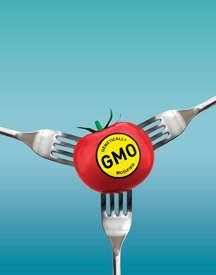GM food labeling advocates attacking issue from all sides
By Ken Roseboro
Published: March 1, 2012
Category: GM Food Labeling and Regulations

To access all the articles in this month's issue of The Organic & Non-GMO Report, SUBSCRIBE NOW.
Initiatives include CA ballot measure, FDA petition, federal and state bills, congressional lobbying
Since the introduction of genetically modified foods in the United States in the mid-1990s, there have been many initiatives to label GM foods at both the federal and state levels, but there have never been as many initiatives going on at once as there are now. Since last fall there has been a Right2Know March from New York City to Washington, DC, an online petition to the Food and Drug Administration calling for GM food labeling that has generated more than 600,000 comments and counting, a ballot initiative in California to put a labeling law on the ballot for this year’s election, federal labeling legislation introduced by Congressman Dennis Kucinich, and most recently a “Dear Colleague” letter circulating in Congress to encourage representatives to support labeling.
Bills introduced in 20 states
Meanwhile, lawmakers in 20 states have introduced bills to label GM foods in the past year, an unprecedented level of legislative activity on labeling. According to the Truth in Labeling Coalition, bills have been introduced in 20 states, including Illinois, Alaska, California, North Carolina, Iowa, Maryland, New York, Oregon, Washington, Rhode Island, West Virginia, Vermont, Tennessee, Hawaii, Connecticut, Massachusetts, Missouri, New Jersey, Michigan, and New Hampshire.
To date, none of the bills have passed, due to lobbying from agribusiness interests with their moneyed influence on state and federal lawmakers.
Alaska has been the only state to pass a GM food labeling law and this applies to GM fish only.
Bipartisan support for Washington labeling bills
In Washington State, two labeling bills were introduced into the legislature in January. The bills were bipartisan with the house bill (HB 2637) introduced by Republican Rep. Cary Condotta, and the senate bill (SB 6298) introduced by Democratic Sen. Maralyn Chase.
Chase argued that the labeling bill is critical to protect Washington’s wheat exports to GMO-sensitive markets such as Japan. “If genetically modified wheat is approved in the United States without a labeling system, the effect on our state’s economy and farmers would be devastating,” she says.
Neither bill passed the House and Senate Agricultural Committees. But Trudy Bialic, director of public affairs at PCC Markets, said bill supporters only had six days to organize.
However, Bialic was encouraged because the bills received strong public support. “The amount of public support with emails, calls, and people showing up at the legislature was almost as big as the turnout for (Washington’s) gay marriage bill,” she says.
Chase says there is good bipartisan support for labeling from both wheat farmers in eastern Washington and sustainable food consumers in western Washington. “It represents an unusual confluence of agreement across the customary divide,” she says.
Supporters plan to re-introduce the bills in the fall, which will allow more time for organizing and talking to legislators.
“They should be promoting their products, not hiding them”
In Connecticut, Rep. Richard Roy has introduced a labeling bill in the state’s General Assembly.
Roy, who is chairman of the environment committee, introduced the bill because of increasing dissatisfaction with the industrial food system. “The industry is running roughshod over our food, and I feel something should be done. If we have labeling, people will have a choice,” he says.
Roy believes the lack of labeling means the biotech industry is hiding something from consumers. “If GMOs are that good, they should be promoting their products, not hiding them.”
Roy believes his bill will pass the environment committee and go to the floor of the Connecticut Assembly for a vote.
Another Connecticut assembly member, Rep. Diana Urban, also supports the labeling bill.
Urban, who is also an economist, argues that labeling makes sense from an economic standpoint. “Markets work best when consumers have s on her side.
Vermont
In Vermont, Rep. Kate Webb of Shelburne introduced H.722, the Vermont Right to Know Genetically Engineered Food Act on February 1. The bill has been referred to the House Committee on Agriculture where testimony was anticipated to occur in February.
Webb says the bill has strong support. “In addition to many of my colleagues, the bill is also supported by the Vermont Right to Know GMOs coalition that is made up of a broad range of farmers, consumer protection, agriculture, and public health organizations.
“Based on the overwhelmingly positive response I have received to the bill I think that Vermonters want to see it passed this session. I do expect that we will see some significant pressure from large biotech food producers as we continue in the process.”
Webb isn’t surprised by the nationwide grassroots action on GM food labeling. “We continue to see more reports of the environmental impacts and possible health effects (of GMOs),” Webb says. “In the face of this Vermonters, and consumers around the country, are simply asking for the right to know—we want to make an informed choice for ourselves and our children.”
© Copyright The Organic & Non-GMO Report, March 2012




